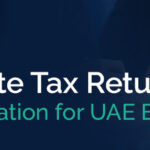The UAE is a financial oasis that has rapidly emerged as a global business hub. It beckons multinational corporations (MNCs) with its strategic location and business-friendly environment. The UAE is not only an inspiration for international trade but has also nurtured a tax landscape that sets it apart from many dominions. As MNCs set their sights on this economic capital, understanding the minutiae of corporate taxation becomes paramount. In this blog, we will explore the unique facets of corporate tax for MNCs in the UAE. Join us on a journey through the tax corridors of the UAE, where economic opportunities converge with strategic tax planning. We will also discuss some technicalities and challenges to corporate tax for MNCs.
What is a Multinational Corporation (MNC)?
An MNC is a firm or business that operates in various countries or nationalities. MNCs are usually headquartered in their home country; however, they operate in multiple countries to reach more customers. Some of the popular MNCs include Microsoft, Apple, and McDonald’s. Multinational corporations are gigantic companies with huge amounts of revenues; therefore, there is a need for a separate categorization of such firms. Simply generating income from foreign sources outside its home country without establishing a foreign presence or registering in another country does not qualify a business as a multinational corporation.
Challenges for MNCs in Taxation
As a multinational corporation, there are a series of challenges concerning taxation. The first and foremost challenge for a MNC is to deal with multiple tax jurisdictions. As MNCs operate in various industries, it is challenging and burdensome to comply with diverse tax laws and regulations. Secondly, determining arm’s length pricing for transactions between different entities of an MNC is a difficult task. Therefore, it is a constant challenge to ensure compliance with transfer pricing regulations and avoid disputes with tax authorities. Thirdly, complying with ever-evolving local tax laws and reporting requirements in each jurisdiction where the MNC operates can be resource-intensive. Fourthly, OECDS’s Base Erosion and Profit Shifting (BEPS) initiatives aim to prevent tax avoidance strategies used by MNCs. Compliance with BEPS rules presents additional challenges for MNCs.
There are a series of other challenges; however, the most important thing is how businesses face and respond to such challenges.
Corporate Tax for MNCs in the UAE
The UAE, as a participant in the OECD BEPS Inclusive Framework, is dedicated to tackling the global challenges encountered by tax jurisdictions. Consequently, the corporate tax regime serves as a means to establish a framework for the incorporation of Pillar 2 rules.
Pillar Two Rules
The “Pillar Two” rules of the OECD Base Erosion and Profit Shifting (BEPS) project propose a common approach for multinationals. It proposes a global minimum tax rate of 15% for large multinational corporations. However, there are some rules and technicalities to the model. We need to understand a “large” multinational from this perspective. A large multinational refers to a business that has aggregate global revenues of over EUR 750 million (UAE Dirham equivalent). The effective tax rate (ETR) of the multinational enterprise (MNE) in the respective jurisdiction is compared to the minimum tax rate of 15%. If the ETR is less than the minimum tax rate, then a top-up tax might be payable by the MNE.
Currently, MNCs in the UAE are subject to corporate tax under the regular tax regime. However, it is expected that further information will be available in due course about the implementation of Pillar 2 rules in the UAE. Furthermore, one can expect a different CT rate for qualifying free zone entities (QFZEs) that are part of a large multinational group once the Pillar 2 rules are in force. The evolving nature of the UAE’s tax regime calls for continuous attention to forthcoming rules and regulations as the nation solidifies its position in the global economic landscape.
Conclusion
In conclusion, the landscape of corporate taxation for multinational corporations (MNCs) in the UAE is dynamic; however, it is challenging. The UAE, with its allure as a global business hub, presents a strategic destination for MNCs, offering a business-friendly environment. Challenges abound for MNCs, particularly in the face of operating across multiple tax jurisdictions.
Engaging in the OECD BEPS Inclusive Framework, the UAE showcases its commitment to tackling worldwide tax challenges. Multinational corporations must remain well-informed and responsive to the evolving tax system. This is particularly crucial in light of anticipated advancements in the implementation of Pillar Two rules and the potential establishment of distinct tax rates for qualifying free zone entities.
Creative Zone Tax & Accounting
Welcome to Creative Zone Tax & Accounting (CZTA)—Your Companion for Piloting the World of Corporate Taxation in the UAE! At CZTA, we understand that in the vibrant setting of multinational business, it is crucial to have a trusted ally for tax and accounting. As specialists in the UAE market, we offer more than just financial services; we provide a channel to success. Partner with CZTA for innovative solutions, strategic tax planning, and personalized service that propels your business forward.



